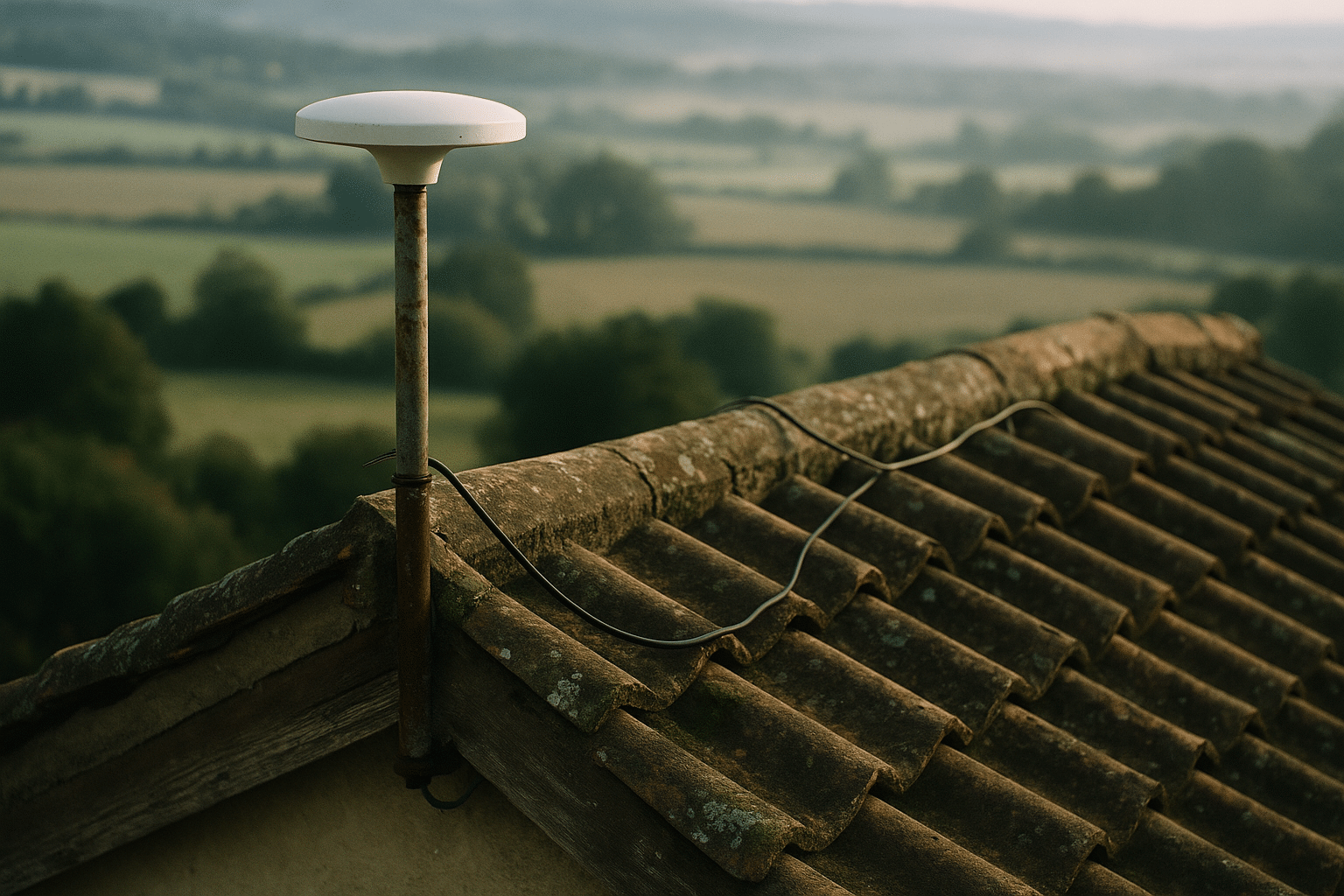
Kabelloses Internet: Grundlagen, Technologien und praktische Tipps
Gliederung
1) Grundlagen des kabellosen Netzes: Frequenzen, Modulation, Reichweite, Interferenzen
2) Technologien im Vergleich: WLAN (IEEE 802.11), Mobilfunk (4G/5G), Richtfunk/FWA, Satellit, Kurzstreckenfunk
3) Einrichtung zuhause: Positionierung, Kanäle, 2,4/5/6 GHz, Mesh, Antennen, Bauphysik
4) Sicherheit und Datenschutz: Verschlüsselung, Segmentierung, Updates, öffentliche Netze
5) Fehlersuche, Messen und Ausblick: Tools, Kennzahlen, Optimierung, Trends
Grundlagen: So reisen Daten durch die Luft
Funk ist die Luftpost der digitalen Welt. Damit kabelloses Internet funktioniert, werden Daten in elektromagnetische Wellen verpackt und über Frequenzbänder gesendet. In lokalen Netzen dominieren Bänder um 2,4, 5 und zunehmend 6 GHz; im Mobilfunk kommen je nach Land niedrige Bänder (700–900 MHz) für Fläche und mittlere Bänder (1,8–3,6 GHz) für Kapazität zum Einsatz. Die Wahl des Bandes ist ein Kompromiss: Niedrige Frequenzen durchdringen Wände besser, höhere Frequenzen bieten mehr Durchsatz, aber geringere Reichweite. Modulations- und Codierungsverfahren (z. B. QAM mit variabler Ordnung) steuern, wie viele Bits pro Symbol übertragen werden, und passen sich an die Funkqualität an. Moderne Verfahren bündeln zudem mehrere Antennenströme (MIMO), teilen Ressourcen effizient (OFDMA) und nutzen Kanäle flexibel, um die verfügbare Luftschnittstelle optimal auszuschöpfen.
Wichtig ist zu verstehen, dass reale Datenraten deutlich unter theoretischen Maxima liegen. Overhead, Protokolle, Signalstärke, Störungen und geteilte Medien reduzieren die Netto-Rate. In der Praxis gelten grobe Daumenwerte: Ein aktuelles Heimnetz im 5‑GHz‑Band liefert häufig 200–800 Mbit/s netto in kurzer Distanz; 2,4 GHz liegt oft zwischen 30–120 Mbit/s, ist dafür robuster über Stockwerke. Mobilfunk erreicht je nach Ausbau 50–400 Mbit/s im Alltag, mit Latenzen von 10–40 ms bei moderner Infrastruktur. Satelliten mit niedriger Umlaufbahn liegen typischerweise bei 50–200 Mbit/s und Latenzen von etwa 20–40 ms, geostationäre Systeme haben wegen der Distanz oft 500–700 ms Verzögerung.
Die Qualität der Verbindung wird von mehreren Stellschrauben geprägt:
– Abstand: Jedes verdoppelte Distanzstück senkt die Feldstärke spürbar.
– Hindernisse: Stahlbeton kann 20–30 dB dämpfen, Ziegel 8–15 dB; Metall reflektiert stark.
– Interferenzen: Nachbarnetze und Haushaltsgeräte (z. B. Mikrowellen, Babyphones) belasten vor allem 2,4 GHz.
– Kanalbreite: Breitere Kanäle bringen Durchsatz, sind aber störanfälliger.
– Antennenausrichtung: Richtantennen erhöhen Reichweite, verlangen aber genaues Zielen.
Wer diese physikalischen Grundlagen kennt, kann Entscheidungen fundiert treffen – von der Routerposition bis zur Technologieauswahl.
Technologien im Überblick: WLAN, Mobilfunk, Richtfunk, Satellit und Kurzstrecke
Die kabellose Landschaft ist vielfältig – und jede Technik hat Stärken und Schwächen. Für Heim- und Büronetze ist WLAN nach IEEE 802.11 die Allzwecklösung. Neuere Generationen (z. B. 802.11ax und 802.11be) bringen Effizienzmerkmale wie OFDMA und verbesserte Mehrantennentechnik, was in dichten Umgebungen spürbar hilft. Sie nutzen 5 und 6 GHz für hohe Datenraten und 2,4 GHz für Reichweite. Mobilfunk (4G/LTE und 5G) ist die mobile Säule: 4G ist weit verbreitet und stabil, 5G steigert Kapazität und reduziert Latenz, besonders in Standalone-Ausbauformen. Fixed Wireless Access (FWA) nutzt Mobilfunk oder lizenzierte Richtfunkstrecken, um Haushalte ohne Kupfer oder Glasfaser anzubinden – eine sinnvolle Alternative in ländlichen Gebieten oder als Übergangslösung.
Satellitennetzte teilen sich in geostationäre Systeme und Konstellationen in niedriger Erdumlaufbahn (LEO). GEO-Systeme decken riesige Flächen ab, kämpfen aber mit hoher Latenz; LEO bietet kürzere Laufzeiten, erfordert jedoch eine klare Sicht zum Himmel und kann wetterabhängig sein. Richtfunk-Links zwischen Gebäuden liefern hohe stabile Raten über mittlere Distanzen, verlangen jedoch direkte Sicht und präzise Montage. Kurzstreckenfunk nach IEEE 802.15.4 oder Nahfeldverfahren eignet sich für Sensorik und Steuerung, nicht jedoch für breitbandiges Internet.
Ein Vergleich wichtiger Kriterien:
– Durchsatz: WLAN 802.11ax/be in der Praxis oft 200–1200 Mbit/s (geräte- und umgebungsabhängig); 5G meist 100–600 Mbit/s; FWA ähnlich Mobilfunk; LEO-Satellit 50–200 Mbit/s.
– Latenz: WLAN typischerweise unter 10–15 ms im LAN; 5G 10–20 ms; 4G 30–50 ms; LEO 20–40 ms; GEO deutlich höher.
– Verfügbarkeit: Mobilfunk punktet unterwegs, WLAN im Gebäude, Satellit abseits jeder Infrastruktur.
– Kosten und Kontrolle: WLAN bietet lokale Kontrolle und oft geringe laufende Kosten; Mobilfunk ist flexibel, aber volumen- oder tarifgebunden; Satellit hat höhere Hardware- und Monatskosten.
Die Praxiswahl ist kein Entweder-oder: Häufig ergänzt Mobilfunk das eigene WLAN als Backup, während FWA oder Richtfunk Übergangsbrücken schlagen, bis eine leitungsgebundene Lösung verfügbar ist.
Planung und Einrichtung zuhause: Stabilität beginnt beim Grundriss
Die schnellste Funktechnik verpufft, wenn der Zugangspunkt ungünstig steht. Idealerweise platzierst du den Router zentral und erhöht, weg von Ecken, Heizkörpern und großen Metallflächen. Offene Flure helfen bei der Verteilung. Dicke Stahlbetondecken sind Funkschlucker; bei mehreren Etagen lohnt ein zusätzliches Zugangspunkt-Modul pro Stockwerk oder ein Mesh-System, das per drahtlosem Backhaul oder besser per Netzwerkkabel die Etagen verbindet. Eine Faustregel: lieber mehrere moderate Zellen als ein einzelner Zugangspunkt, der „durch Wände brüllen“ muss.
Kanäle verdienen Aufmerksamkeit. Im 2,4‑GHz‑Band sind die überlappungsfreien Kanäle begrenzt; Nachbarschaftsverkehr sorgt schnell für Staus. 5 GHz bietet mehr Auswahl und oft weniger Störungen, während 6 GHz zusätzliche, relativ freie Kanäle beisteuert – dafür ist die Reichweite geringer. Automatikfunktionen können gute Ergebnisse liefern, aber manuell prüfen schadet nicht: Ein kurzer Scan verrät, welche Kanäle gerade frei sind. Auch die Kanalbreite spielt hinein: 80 oder 160 MHz bringen Geschwindigkeit nah am Zugangspunkt, 40 MHz sind robuster über Distanz.
Ein paar praxisnahe Hebel:
– Zugangspunkt nicht hinter dem Fernseher, in Schränken oder direkt am Boden verstecken.
– Multi-AP-Setups mit identischem Netzwerknamen und sauber geplanten Sendeleistungen gestalten, damit Endgeräte sinnvoll roamen.
– Für IoT- und Altgeräte das 2,4‑GHz‑Band anbieten, anspruchsvolle Anwendungen wie Videokonferenzen ins 5/6‑GHz‑Band lenken.
– Wo möglich, stationäre Bandbreitenfresser (TV-Box, Konsole, NAS) per Kabel anbinden, damit Funk Luft bekommt.
– QoS-Funktionen nutzen, um Sprache und Video zu priorisieren, ohne andere Apps auszuhungern.
Bauphysisch hilft es, die größten Hindernisse zu kennen: Eine Tür aus Holz dämpft wenig, eine Stahlbetonwand viel. Spiegel- und Schrankwände können Signale reflektieren und Hotspots sowie Funklöcher erzeugen. Mit etwas Geduld, einem Grundriss und kurzen Tests an mehreren Positionen findet man den Sweet Spot oft in Minuten.
Sicherheit und Datenschutz: Schutzschicht für die Luftschnittstelle
Offene Luft ist ein geteiltes Medium – deshalb gehört Verschlüsselung an erste Stelle. Aktuelle Verfahren mit starker Authentifizierung schützen vor Lauschern auf der Funkstrecke. Nutze komplexe, individuelle Passwörter und schalte veraltete Modi ab, damit ältere, unsichere Protokolle keine Hintertür bieten. Eine sinnvolle Ergänzung ist ein separates Gastnetz für Besucher: So bleiben eigene Geräte und Dienste vom fremden Traffic getrennt. Für smarte Haushaltsgeräte empfiehlt sich ein eigenes Segment oder VLAN, das nur ins Internet darf, nicht jedoch ins interne LAN.
Regelmäßige Firmware-Updates sind kein lästiges Beiwerk, sondern Teil der Sicherheitsarchitektur. Hersteller schließen damit Schwachstellen, verbessern Stabilität und leisten manchmal sogar Performance-Feinschliff. Schalte zudem Verwaltungsschnittstellen von außen ab, verwende statt Standard-Adminnamen eigene Benennungen und aktiviere eine mehrstufige Anmeldung, wenn verfügbar. In öffentlichen Netzen gilt: Traue nur Verbindungen, die du selbst kontrollierst. Ein privater Tunnel (z. B. ein vertrauenswürdiger VPN‑Dienst) kann den Datenverkehr absichern, vor allem bei sensiblen Tätigkeiten wie Banking.
Präventive Checkliste:
– SSID und Zugangsdaten nicht teilen; QR‑Codes nur an bekannte Personen weitergeben.
– WPS und ähnliche Komfortfunktionen nur gezielt und zeitlich begrenzt aktivieren.
– Protokolle und Logs prüfen, um ungewöhnliche Anmeldungen zu erkennen.
– Geräteinventar pflegen und nicht benötigte Funkmodule (z. B. Hotspot-Funktion am Smartphone) deaktivieren.
– Kinderschutz und Zeitprofile nach Bedarf nutzen, um ungewollte Zugriffe zu begrenzen.
Sicherheit ist kein Zustand, sondern ein Prozess. Wer Grundregeln verinnerlicht und ab und zu einen kleinen Audit macht, erhöht das Schutzniveau deutlich – ohne den Alltag zu verkomplizieren.
Fehlersuche, Performance-Messung und Zukunftsausblick
Wenn das Netz zickt, hilft systematisches Vorgehen. Starte mit einem lokalen Geschwindigkeitstest direkt neben dem Zugangspunkt und wiederhole ihn in typischen Nutzungszonen. Ändert sich die Rate stark mit der Entfernung, ist es ein Reichweiten- oder Störproblem; ist sie überall schlecht, liegt die Ursache oft an der Anbindung, am Endgerät oder am gewählten Kanal. Ping-Werte zeigen Reaktionsfähigkeit, Paketverlust deutet auf Überlast oder Funkstörungen hin. Ein kurzer Spektrum-Scan offenbart dichte Nachbarschaftskanäle, sporadische Störer oder zu breite Kanalwahl. Prüfe außerdem, ob die Gegenstelle (Server, Cloud-Dienst) die gewünschte Rate liefern kann – das schwächste Glied bestimmt die Kette.
Konkrete Schritte zur Stabilisierung:
– Zugangspunkt neu positionieren und Sendeleistung feinjustieren; zu viel Leistung verschlechtert Roaming.
– Kanalwahl anpassen, Kanalbreite reduzieren, wenn Interferenzen dominieren.
– Firmware aktualisieren, Endgeräte-Treiber auf den neuesten Stand bringen.
– Testweise ein zweites Zugangspunkt-Modul ergänzen, um tote Zonen zu eliminieren.
– Mobilfunk-Backup aktivieren, wenn die Festnetzanbindung schwankt.
Zur Interpretation zahlenbasierter Tests gilt: Eine stabile Latenz mit geringer Streuung ist für Videokonferenzen wertvoller als absolute Spitzendurchsätze. Für Streaming zählen nachhaltige 25–50 Mbit/s pro 4K‑Stream; für Cloud-Gaming sind neben 50–100 Mbit/s vor allem 20 ms und darunter relevant.
Der Blick nach vorn: In lokalen Netzen bringen künftige 802.11be‑Implementierungen höhere Modulationsordnungen, Multi‑Link‑Betrieb über mehrere Bänder und feinere Zeitplanung – gut für dichte Wohnungen und Büros. Im Mobilfunk verfeinern weiterentwickelte 5G‑Varianten die Latenz und verbessern Energieeffizienz pro übertragenem Bit. Das 6‑GHz‑Band öffnet zusätzliche Kanäle, erfordert aber kluge Planung, weil Wände stärker dämpfen. Für ländliche Regionen werden FWA‑Lösungen und LEO‑Satellitensysteme zur wichtigen Brücke, bis glasfaserbasierte Netze flächig liegen. Klar ist: Kabelloses Internet wächst zur gleichberechtigten Säule neben Leitungen – nicht als Ersatz, sondern als agiles Gegenstück.
Fazit für Praxisanwender
Wer die Funkgrundlagen kennt, Technologien passend zum Einsatz wählt und Heimnetze sauber plant, gewinnt spürbar an Tempo, Stabilität und Sicherheit. Beginne mit Standort und Kanälen, trenne sensible Geräte logisch ab, halte Software aktuell und messe Veränderungen gezielt nach. So wird aus „mal geht’s, mal nicht“ ein verlässlicher Alltagsbegleiter – im Homeoffice, beim Lernen, im Stream und überall dort, wo Kabel stören würden.


